Star Trek: The Next Generation is thirty years old this month! To celebrate, Redeeming Culture is assembling the finest crew of culture redeemers from all over the internet to investigate the spiritual harmonies in this cornerstone of science fiction.
For more about Trektember, read our preview post. Please note that there are minor plot spoilers for this episode below.
Redeeming Culture regular David Lichty moves us along with season 2, episode 16: Q Who…in which the story team kick-drops 24th century human superiority and finally makes our crew put on their Big Boy Pants.
Recap & Review
On Redeeming Culture, we often discuss the unavoidability of running into God’s truths when making honest art and doing thoughtful storytelling. For Star Trek: The Next Generation, the 16th episode of its second year seems to be when they finally admitted it.
Before this point, Gene Roddenberry’s vision of an unflappably perfected humanity permeated this show; the main characters could not have any real personal problems. They were people without failings, so any strong conflict had to come from outside the ship. In addition to limiting dramatic possibilities, that is not a realistic portrayal of the human condition. But in this episode, this crew’s ultimate foil sends them across the galaxy to meet their ultimate enemy; and in so doing, he reveals their vanity.
What about this “Q” guy?
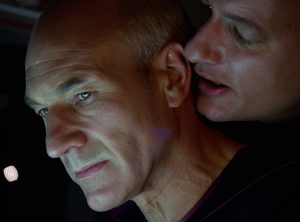 Q has an interesting role in the series, metaphorically standing in, in turns, for both God and a type of devil. He begins his tenure in the show displaying his power as the literal accuser of humanity (if that rings any biblical bells for you), and his accusations aren’t always wrong; but here, he challenges the Enterprise crew with their need, presenting himself as the only way out of trouble as the devil did with Jesus in the desert.
Q has an interesting role in the series, metaphorically standing in, in turns, for both God and a type of devil. He begins his tenure in the show displaying his power as the literal accuser of humanity (if that rings any biblical bells for you), and his accusations aren’t always wrong; but here, he challenges the Enterprise crew with their need, presenting himself as the only way out of trouble as the devil did with Jesus in the desert.
“The LORD Almighty has a day in store for all the proud and lofty, for all that is exalted (and they will be humbled)…”
-Isaiah 2:12, NIV
This was Q’s third appearance in only 40 episodes. He generally showed up to meddle with the crew and prickle Picard, so the first time I saw Q Who I thought, “Oh well, it’s going to be one of these,” and I settled in, sure of what I’d be getting, much like the Federation had settled in. Then I saw him address some real hubris on this crew’s part. You see, on this Enterprise, the people really do believe that ultimately, they can handle anything.
PICARD: How can we be prepared for that which we do not know? But I do know that we are ready to encounter it.
Q: Really?
PICARD: Yes. Absolutely. That’s why we’re out here.
Q: Oh, the arrogance. …You judge yourselves against the pitiful adversaries you have encountered so far. The Romulans, the Klingons. They are nothing compared to what’s waiting. Picard, you are about to move into areas of the galaxy containing wonders more incredible than you can possibly imagine, and terrors to freeze your soul.
Q sends the ship way across the galaxy, where they encounter the Borg for the first time, easily the most important opponents in The Next Generation (Unsurprisingly, all of their essential episodes have been chosen to be covered this Trektember). The Borg had been intended to arise in some rewritten season one episodes, so by this point the Borg idea had some time to simmer.
In addition, Q episodes always got great care and attention from the studio. They were budgeted higher for sets and effects, giving this one greater freedom to encounter and explore its new life form. The music was more cinematic than usual, letting us know the crew were feeling mystified and overwhelmed. A gothic organ sound was used when the Borg first intruded upon the ship, and notes of horror tinted the score overall. The “safety” theme at the end may be one of the best pieces of music in the entire series – relief deeply woven into its notes. This was an episode where every department gave their best, and it shows; most notably in how alien the Borg still feel, even 29 years later. With 15 other episodes and one feature film involving these villains, they always feel newly unsettling in this one.
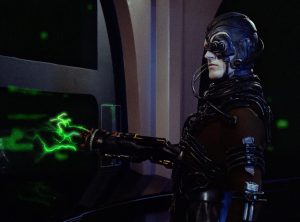 You see, the Borg were not merely another culture, representing some familiar element of our own. They were designed by the writers to be not only more powerful than the Enterprise and its crew, but also to be implacable and inscrutable. In a way, this is our heroes’ first encounter with something truly alien, from the shape of their ship to the fact that the Borg all but ignore the crew when they board the Enterprise. With no singular voice like the upcoming Locutus, Lore, or Borg Queen, our nemeses are at their most Borg-ly alien in Q Who. Given time to simmer, as a story creation, the Borg hit the series fully formed.
You see, the Borg were not merely another culture, representing some familiar element of our own. They were designed by the writers to be not only more powerful than the Enterprise and its crew, but also to be implacable and inscrutable. In a way, this is our heroes’ first encounter with something truly alien, from the shape of their ship to the fact that the Borg all but ignore the crew when they board the Enterprise. With no singular voice like the upcoming Locutus, Lore, or Borg Queen, our nemeses are at their most Borg-ly alien in Q Who. Given time to simmer, as a story creation, the Borg hit the series fully formed.
And that formation is an unsettling one. The Borg violate a concept that is both scriptural and known innately: We Are Individuals. At the most obvious level, the Borg represent a perfect collective. They are the utmost socialists and universal monopolizers, pursuing and absorbing any who aren’t already a part of them. In this episode, we get shades of that from this faceless, singularly-driven race.
Q: The Borg is the ultimate user. They’re unlike any threat your Federation has ever faced. They’re not interested in political conquest, wealth or power as you know it. They’re simply interested in your ship, its technology. They’ve identified it as something they can consume.
PICARD: How do we reason with them? Let them know that we are not a threat?
GUINAN: You don’t.
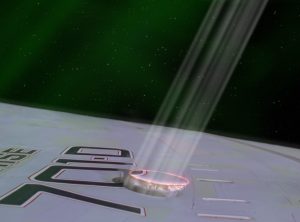 In the documentary “Making It So: Continuing Star Trek – The Next Generation,” director Rob Bowman points out that in every episode to date, there would be a thing that gets encountered at the beginning of the show, and by the end of the show, the Enterprise crew would have helped it, conquered it or solved it. For Q Who, the very goal of the episode was to give them something to encounter with which they could not do any of those things. This was the first time it felt like our Star Trek heroes were comprehensively out of their league.
In the documentary “Making It So: Continuing Star Trek – The Next Generation,” director Rob Bowman points out that in every episode to date, there would be a thing that gets encountered at the beginning of the show, and by the end of the show, the Enterprise crew would have helped it, conquered it or solved it. For Q Who, the very goal of the episode was to give them something to encounter with which they could not do any of those things. This was the first time it felt like our Star Trek heroes were comprehensively out of their league.
They try all of Star Trek’s usual responses to the unknown – peaceful engagement, investigation, attack, and flight – and none of them work. The Borg turn them to flight, having inflicted brutal scars.
PICARD: Eighteen of our people have died. Please, tell us this is one of your illusions.
Q: Oh, no. This is as real as your so called life gets.
For the first time, the Enterprise crew were confronted with an enemy they could not understand, negotiate with, or defeat. There were no options here. The Borg had brought them to the end of their rope.
“The greatest trick the Devil ever pulled was convincing the world he didn’t exist.”
-Verbal Kint, The Usual Suspects
Here’s a metaphorical use of The Borg, one about as sharp as a big, dull rock: We are unable, on our own and as a group, to successfully fight the sin which is in us. Mmm, okay, it does work.
I think The Borg better represent the danger we don’t expect, and maybe even don’t believe in. Spiritual entities, like The Borg, do not care about us or our individuality. They cannot be negotiated with, overpowered, or outwitted. We need deliverance from actual forces of evil in the world, and we can’t do it.
“…Rescue me, LORD, from evildoers; protect me from the violent.”
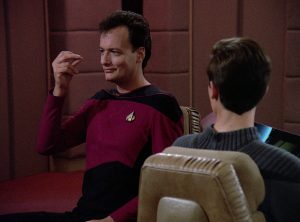 37 minutes into this episode, the Enterprise crew still don’t know what they’re dealing with, they have learned little, they have been wounded, and they are being overtaken as they flee. They basically need divine help. It is the only way they can be rescued from The Borg. Picard relents, and admits to Q that they need him.
37 minutes into this episode, the Enterprise crew still don’t know what they’re dealing with, they have learned little, they have been wounded, and they are being overtaken as they flee. They basically need divine help. It is the only way they can be rescued from The Borg. Picard relents, and admits to Q that they need him.
This acknowledgement of need satisfies Q; who snaps his fingers, and they’re back home, free from the Borg (for the moment). It’s a rare case where deus ex machina is actually a good storytelling tactic.
“The prudent see danger and take refuge, but the simple keep going and pay the penalty.”
Q: That was a difficult admission. Another man would have been humiliated to say those words. Another man would have rather died than ask for help.
PICARD: I understand what you’ve done here, Q, but I think the lesson could have been learned without the loss of eighteen members of my crew.
Q: If you can’t take a little bloody nose, maybe you ought to go back home and crawl under your bed. It’s not safe out here. It’s wondrous, with treasures to satiate desires both subtle and gross, but it’s not for the timid.
Space is dangerous. The creative team had hoped to insert this idea into the show with the death of Tasha Yar in Skin of Evil, but that was generally overridden by the seeming inappropriateness of just dispatching a lead so carelessly. Q Who finally showed them some real danger.
PICARD: Well, perhaps what we most needed was a kick in our complacency, to prepare us ready for what lies ahead.
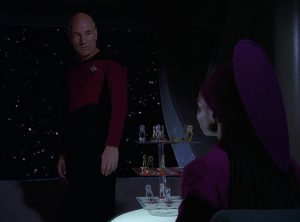 What he had learned was that this danger was real, and that ineludably, they would be coming. For us, the unaccepted dangers are already here, their battles hitting us in the realm of thought, but they are relentless, they are effective, and yes, most of us don’t believe in them. That’s not as important in itself as it is that it indicates either a disbelief in the living God, or in His truthfulness in His details. We don’t need to focus on the angelic, but to deny it because all the cool kids sneer is to put the conventional wisdom of people over the revelations of a truthful God.
What he had learned was that this danger was real, and that ineludably, they would be coming. For us, the unaccepted dangers are already here, their battles hitting us in the realm of thought, but they are relentless, they are effective, and yes, most of us don’t believe in them. That’s not as important in itself as it is that it indicates either a disbelief in the living God, or in His truthfulness in His details. We don’t need to focus on the angelic, but to deny it because all the cool kids sneer is to put the conventional wisdom of people over the revelations of a truthful God.
When I finally saw it, this episode made me excited about Star Trek again. The writers were willing to really test the crew, to hurt them and push them. It makes the characters more authentic, and the show more truthful.
Because space isn’t safe. There are real threats in our world, things in us and outside us; and we must be delivered from them to have any hope.
• • •
Thank you for reading Redeeming Culture! Trektember will be back tomorrow with Peak Performance, so make sure you come back!
• • •
David Lichty is a movie buff and staff writer for Redeeming Culture. You’ve heard his voice in several podcast episodes, and you’ll hear more from him before Trektember is over! He’s also writing the ongoing Trek Backstory miniseries, which explores the behind-the-scenes production parables of TNG.

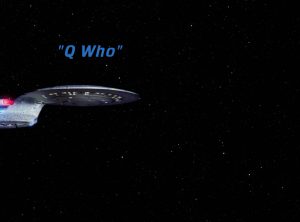


Great comments on a great episode!
As much as Scripture affirms our individuality, it also affirms the human need to be interconnected. From it being “not good” for the human to be alone in Genesis 2 from the interrelationship of the parts of the body of Christ (and even to the early church sharing all things in common, Acts 2), there is a positive vision of “collective” set forth in the Bible. The difference between it and the Borg collective, of course, is that Christian collective doesn’t make us less individuals, but more – *and* we discover our true individuality only as we mature and become more like Christ.
Speaking on a strictly Trek level for a minute, this was one of the few times the Borg were really used to their full potential. So creepy! And I like that the “tease” we get in Act 1 about Q and Guinan’s past dealings was never really addressed… some things best left in the realm of mystery!
Thank you, Mike!
In relating the Borg to reality, I think it’s appropriate to put the emphasis here on the evils of collectivism, over any benefits, if only because of what’s being illustrated. The primary way the Borg destroy individuality regards identity. More wrong than their absorbing of material and value is that becoming a Borg erases you. Who you are disappears. We know that Jesus did not come to abolish our identities, but to complete them, that we are, each of us, fearfully and wonderfully made, which speaks more of specificity than uniformity. The Borg almost function better as foil than villain, at least in this area. The Federation represents Roddenberry’s socialist utopia, which avails us here of a potent contrast between his vision and doing it wrong.
Nevertheless, I see your pushback, and agree with your points in the context you give. It *is* not good for the man to be alone. I often cite that formative verse in defense against too much veneration of singleness, or self-reliance. I note that more than we simply need someone, we usually need a specific someone. We do not fall in love with everyone. We do not even befriend everyone. We are more than our functions. We are each much more specific than we are representatives of our demographics, or any group identity.
I have a friend who writes on identity and Christianity, who posits the idea that each of us understands, and reveals to others, different aspects of God. There are things you see that I wouldn’t, and vice-versa, and part of what is attractive about others comes from the distinctive ways we see our Lord reflected in them. It’s an interesting theory. There certainly is an element of what we could call chemistry in human relationships.
The Borg were a great invention! It’s hard for me to pick a best episode out of the three episodes this group is covering. Here there be mystery aplenty for sure. Then The Best of Both Worlds makes the most of their adventure potential, and realizes the scope of their destructiveness. And I, Borg employs them to cut a razor sharp line down a complex issue. These guys were a Christmas present for this show!